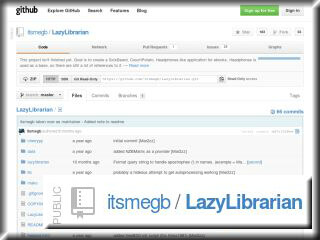LazyLibrarian Review
Last Updated: Jul 07, 2025

| Rating |  |
| Price | Free |
| Features | LazyLibrarian Software |
| Ebook and Audiobook Management Tool | |
| Integrates With OpenLibrary and GoogleBooks | |
| Headphones-Style Interface |
LazyLibrarian is designed to be the equivalent of CouchPotato, SickBeard, and Headphones, but specifically for eBooks and audiobooks. Users familiar with those other programs will find LazyLibrarian intuitive, thanks to its customizable features.
This open-source software operates under the GNU GPL license. Originally developed by a single creator who eventually stepped back, the project has since been taken over by Itsmegb, who continues to enhance the software. Recent checks indicate that LazyLibrarian receives weekly updates, whether major or minor, reflecting an active development cycle.
Highlighted Features
- Import an existing Calibre library (optional)
- Find authors and add them to the database
- List all books by an author and mark eBooks or audiobooks as ‘wanted’
- Search for NZB files, torrents, or magnet links for those books
- Automatically send found NZB/torrent/magnet links to a download client or save them in a black hole for later retrieval
- Process downloaded books by saving cover images (if available) and storing all metadata in a Calibre-compatible format (metadata.opf)
- A responsive new theme allows access from devices with smaller screens, such as tablets
- AutoAdd feature for book management tools like Calibre, which requires a flattened directory structure, or use Calibre to import your books into an existing library
- Search for and download magazines, while monitoring for new issues
Where it Stands
Currently, users of Headphones will find the interface for LazyLibrarian very familiar. This similarity arises because the data tables used in Headphones are also employed to generate the book tables for LazyLibrarian, as noted by the developer.
The program is equipped to perform numerous functions that e-bibliophiles will find beneficial. It can search for authors and books, adding them to the program’s database, and list all books by a specific author as “wanted.”
LazyLibrarian effectively works with NZB files, requiring a Newznab-supported site to function. It scans listings to find NZB files for the desired books. Once found, LazyLibrarian sends these NZBs to SABnzbd or a black hole for another application to complete the download.
In terms of organization, LazyLibrarian excels by downloading cover images for eBooks and saving metadata in a format compatible with Calibre, a widely-used open-source eBook management program. This synergy simplifies the process of obtaining, organizing, and transferring eBooks to your reading device.
The software draws information from Google Books and Goodreads for books and authors. Future updates aim to expand capabilities to include information for books in languages beyond English.
While LazyLibrarian is a powerful tool, it does have some limitations. Developers acknowledge the need for enhancements and welcome contributions through pull requests for those skilled in CSS. Although it has features that require further development, it remains an excellent resource for users interested in utilizing NZB files to access a vast array of copyright-free books available online.
Currently, it supports the following download clients for Usenet:
- SABnzbd
- NZBGet
- Synology_downloadstation
For torrents and magnets, it supports the following download clients:
- Deluge
- Transmission
- uTorrent
- qBittorrent
- rTorrent
- Synology_downloadstation
In addition to the aforementioned features, the new theme facilitates access from smaller devices like tablets. LazyLibrarian also provides functionality for searching and downloading magazines while keeping track of new issues.
Installation
LazyLibrarian runs by default on port 5299 at http://localhost:5299.
Linux / Mac OS X:
- Install Python 2 v2.6 or higher, or Python 3 v3.5 or higher
- Git clone/extract LL to your preferred location
- Run
python LazyLibrarian.py -dorpython LazyLibrarian.py --daemonto start in daemon mode - Complete the configuration (see the documentation)
LazyLibrarian Status
As of our most recent check, LazyLibrarian has transitioned its source repository from GitHub to GitLab. All open issues have also migrated to the new repository, as the old one is no longer maintained. The last update occurred approximately two months ago, indicating that the current developers are more actively engaged than their predecessors.







